Honor the impulse to write: A Midlife Author interview with Karen Dukess
Also: Puppy chaos and late-fall beauty
No one needs permission to write. We all have a voice and we can all learn how to express it. I had a writing teacher who said “if there's something you're not good at, like dialogue or description, you can learn how to do it.”
—Karen Dukess
Today I’m excited to bring you a Q and A with Karen Dukess, who wrote one of my favorite novels of the past few years. Karen is the author of The Last Book Party, a coming-of-age story: Eve, a twenty-something editorial assistant, spends the summer of 1987 on Cape Cod, working for a famed New Yorker writer who summers on the Cape, and who hosts a renowned (or infamous) literary costume party. Glamour, romance, loss of innocence, and coming of age ensue…. The Last Book Party also evokes the setting of the outer Cape and its late-’80s time setting beautifully. (A few months back, I included The Last Book Party on a reading list of mostly coming-of-age novels.)
Karen’s work in the years before she wrote fiction took her far afield: she worked as a tour guide and magazine publisher in the former Soviet Union, and, back in the US, as a newspaper reporter in Florida, and speechwriter on gender equality for the United Nations Development Programme in New York. She’s also written for The Huffington Post and reviewed books for USA Today. She has a degree in Russian Studies from Brown University and a master’s in journalism from Columbia University. She lives with her family near New York City, spending as much time as possible in Truro on Cape Cod.
Karen also hosts a series of author talks for Castle Hill, an art center in Truro, and you can catch recordings of past talks here, including interviews with Gabrielle Zevin and Catherine Newman.
Hi Karen! You’ve worked as a writer for much of your career, but in the realm of nonfiction. Can you talk about those years, and your turn towards fiction? What were those first glimmers for you, and what did you do next?
Despite an inner, maybe even a secret, desire to write fiction, I spent most of my career doing every kind of writing but fiction. I was a newspaper reporter, a magazine writer, a features editor for a newspaper, a book reviewer, a blogger, a press officer, and a speechwriter. All of that writing came relatively easy to me because I didn't put my heart and soul into it. It was just work, nothing personal on the line. I had taken writing classes during college, but I was very intimidated by the more serious writers on campus, people like Rick Moody, Jeff Eugenides, and Don Antrim. Those were the real writers, I thought. I was just a dilettante.
For years after college, I continued dabbling in fiction, but with no follow-through. My inner critic always shut me down immediately. It wasn't until I was 50 and joined a writing group that I started doing the kind of writing that mattered to me. It was in that writing group that I learned to let go and trust that if I didn't give up, I would figure out what I wanted to say and how best to say it.
What do you know now as a writer that you wish you’d known when you first started writing fiction? What do you miss about those first days of writing?
I wish that I'd known to honor the impulse to write and not to wait until I had clarity on why I wanted to write and what specifically I wanted to say. I'm one of those writers who starts with a vague idea and has to get quite deep into it to know where I'm going and why. I wish I'd known how much faith and trust it takes to write fiction.
Once I was immersed in writing The Last Book Party, I loved the sense of freedom that came from writing only for myself. No one was waiting for it, few people even knew I was working on a novel at all. Other than my writing group, it was a private endeavor. When I finished the manuscript, I had the greatest sense of satisfaction. I had achieved a goal that I'd harbored for a long time—a lifetime, really—and I was happy with that. I didn't know if anyone else would love my novel, but I was pleased with it and wanted to share it with the world. That was a sweet victory, not as much of an adrenalin rush as it was to sell the book, but maybe even more deeply satisfying.
Can you talk about a challenge you’ve faced, in writing, publishing, or both?
My career as a novelist has not been a typical one. While most people face a lot of rejection before selling a novel, I signed with the second agent that I queried and sold my first novel at auction within two weeks of it going out on submission.
My second novel was a different story. It was difficult to write—not only did I suffer from second-novel syndrome, afraid that the first novel had been a fluke, but my new novel was set in Russia, where I lived and worked for six years in the 1990s. The novel was about an American woman's midlife crisis during a visit to Russia and reflected on both 1990s Russia and Putin's Russia. I was burdened by a need to get Russia “right,” something that far greater minds than mine have struggled with for decades. I not only had to quiet my own inner critic, but also had to overcome my fears of what my friends from those years, ex-pats and Russians alike, would think of my take on this complicated country. And then the novel went out on submission a few months after Russia invaded Ukraine; in other words, terrible timing. The context had changed so dramatically and I was unsure about publishing my novel at this time. And fortunately or unfortunately, editors felt the same. After a round of rejections, I decided to set the novel aside indefinitely. It was disappointing, but I was aware even then how lucky I had been. All writers experience rejection, I told myself, and now was my turn to find out how I would deal with rejection. If I was a real writer, I would plow ahead.
And once I dried my tears, I discovered that failing to sell this novel had left me with a new attitude that turned out to be very liberating. I had spent nearly three years working on the Russia novel, three years which, honestly, were not a lot of fun. I decided that if I was going to write another novel, I had to have fun doing it. In writing this next novel, I would satisfy and amuse only myself. I was freed from the burden of being “serious” or of “saying something important.” It turns out that this is a much more joyous way to write! There were no “shoulds” in writing this novel. I wrote as playfully as I used to write when I was a child.
I wish that I'd known to honor the impulse to write and not to wait until I had clarity on why I wanted to write and what specifically I wanted to say. I'm one of those writers who starts with a vague idea and has to get quite deep into it to know where I'm going and why. I wish I'd known how much faith and trust it takes to write fiction.
What makes a midlife writer a stronger writer?
Midlife writers are often stronger for having accrued more experience and wisdom. Also, by the time you're 50, you've just got so much more material! I took a class at the 92nd Street Y when I was working on The Last Book Party, and a young classmate was amazed at some of the things, little details and nuggets of knowledge about obscure things, that I'd included. “How do you come up with this stuff?” she asked, as if I'd consulted some mysterious reference book. And I answered “I've lived a life!”
What would you tell someone who’s thinking about starting to write, or someone who thinks it’s too late?
I honestly believe it’s never too late. No one needs permission to write. We all have a voice and we can all learn how to express it. I had a writing teacher who said “if there's something you're not good at, like dialogue or description, you can learn how to do it.” And that was a bit of a revelation to me. Like many new writers, I was caught up in the idea that writing was a talent that you either had or you didn't have. But as long as you have the desire to write, as long as you give yourself permission to write, you can learn and improve. You just have to be willing to work hard, because it is hard!
I decided that if I was going to write another novel, I had to have fun doing it. In writing this next novel, I would satisfy and amuse only myself. I was freed from the burden of being “serious” or of “saying something important.” It turns out that this is a much more joyous way to write! There were no “shoulds” in writing this novel. I wrote as playfully as I used to write when I was a child.
Tell us about your next novel.
My next novel is the fun one! It's called Welcome to Murder Week and it's about Cath Little, a young American woman who discovers that her late, estranged mother had purchased tickets for the two of them to travel to an English village to participate in a “solve-a-fake-murder-mystery” week. Teaming up with her two cottage-mates—Wyatt Green, 40, who works unhappily in his husband’s birding store, and Amity Clark, 50, a divorced romance writer struggling with her novels—Cath sets about solving the “crime” and along the way begins to unravel shocking truths about her mother. Amidst a fling—or something more—with a handsome local maker of artisanal gin, Cath and her fellow sleuths find that their week of fake murder may help them face some very real crossroads in their own lives. My publisher, Scout Press (an imprint of Simon and Schuster) calls it an “fresh, inventive twist on the murder mystery” and I hope that's true. I had a lot of fun playing with the tropes of Golden Age detective fiction and the many mysteries on Masterpiece Theater and Britbox.
And last, tell us about a book that you think deserves more attention.
One of my favorite books of the past few years is Fellowship Point by Alice Elliott Dark. It's got everything I love—gorgeous writing, a well-captured setting in Maine, a story about two older women, dear friends, spanning decades, and a literary mystery. I recommend it all the time. [Sarah’s note: Agree! Fellowship Point was my favorite novel of 2023!] And for straight-up mysteries, I recently discovered the British author Elly Griffiths. She's best known for her Ruth Galloway series, but my favorite of her many books is The Post Script Murders, in which crime novelists start ending up dead. A great read for fans of literary mysteries. Griffiths mentions lots of Golden Age crime writers in the book; I was so intrigued by one of them whom I'd never heard of that I looked her up in the library—only then did it dawn on me that this writer was entirely fictional! I had a good laugh at my own expense.
Find Karen at her Substack, Keep Calm and Carry On.
Last month’s Midlife Author interview, below.
Puppy chaos and late-fall beauty
We have a new puppy, and his name is Otto. He loves rooting through the leaves, he’s shy but curious, and we’re all adjusting. (And the house is a mess….)
And the peak of fall color has passed here in New Hampshire, but the afternoon light has been beautiful. Getting to know Otto and taking rail walks have been good antidotes for my election anxiety.
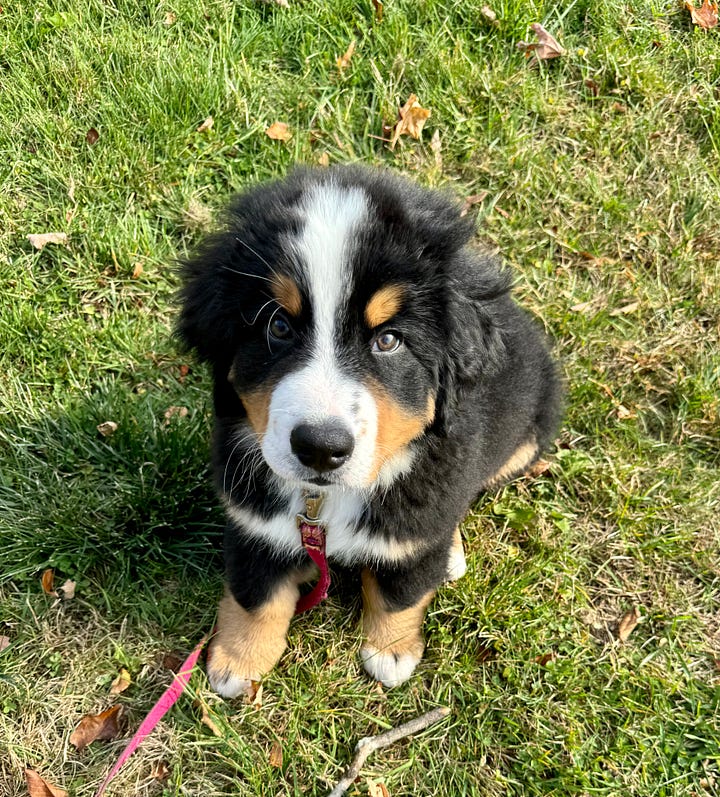


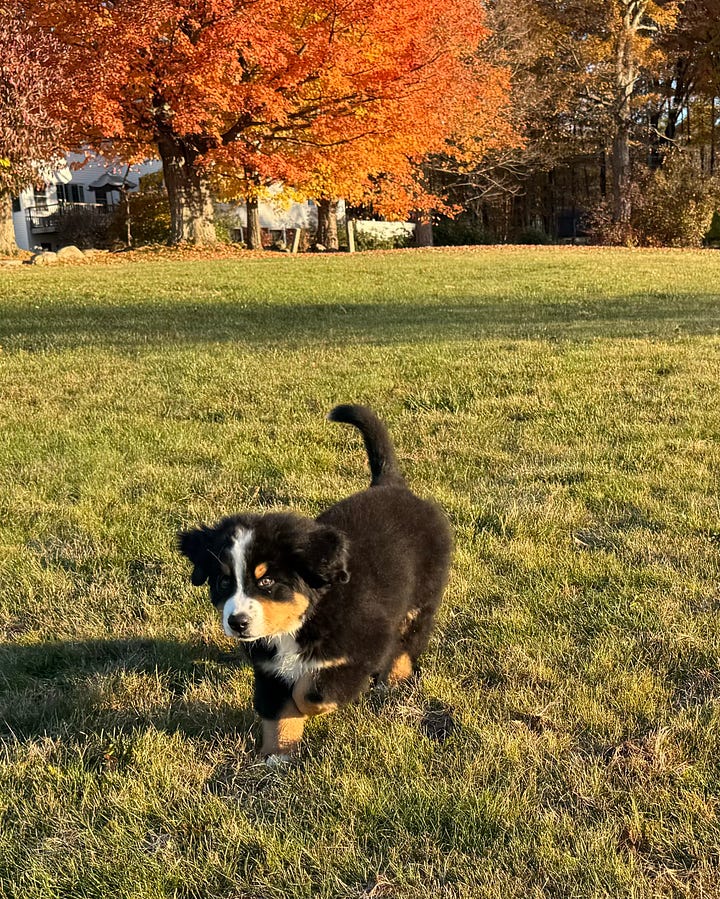
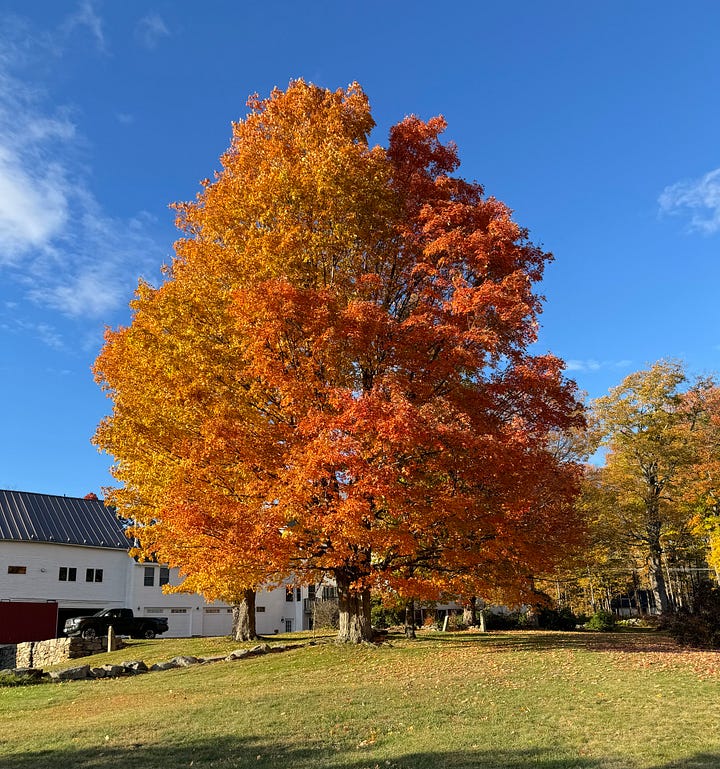
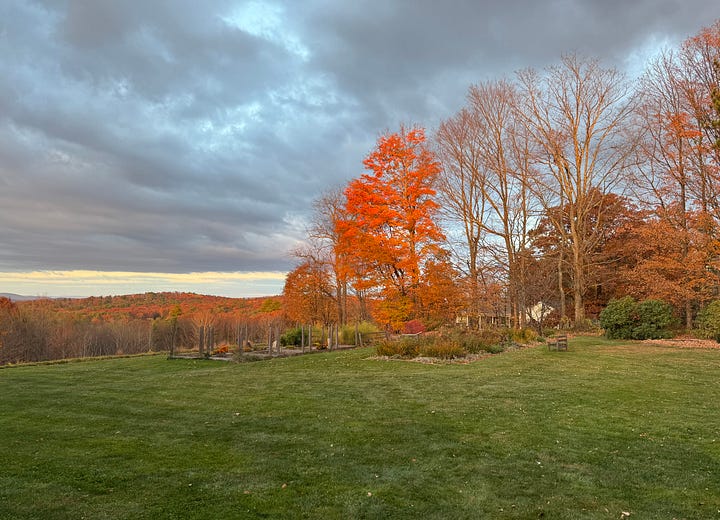
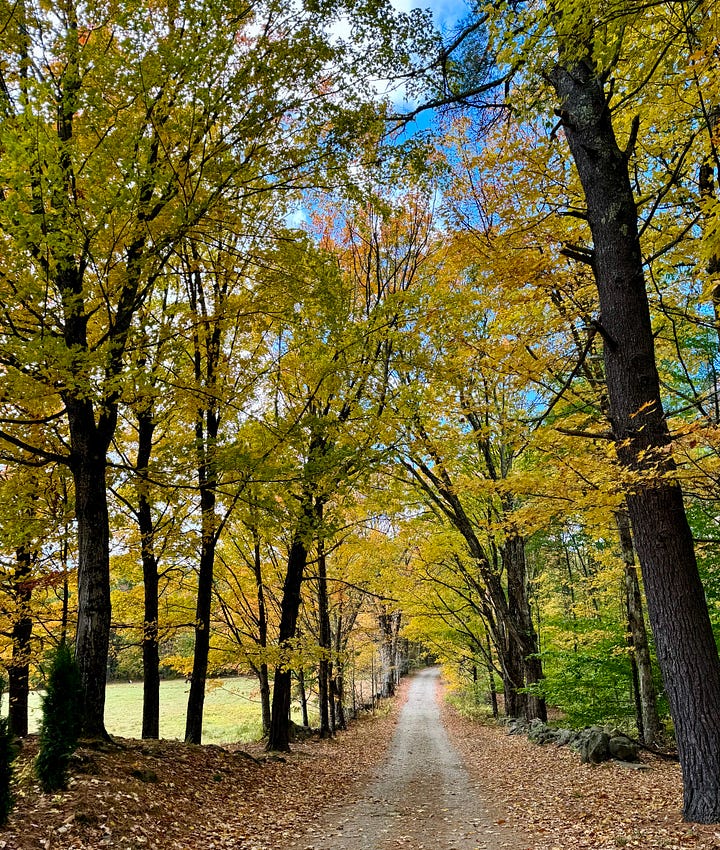
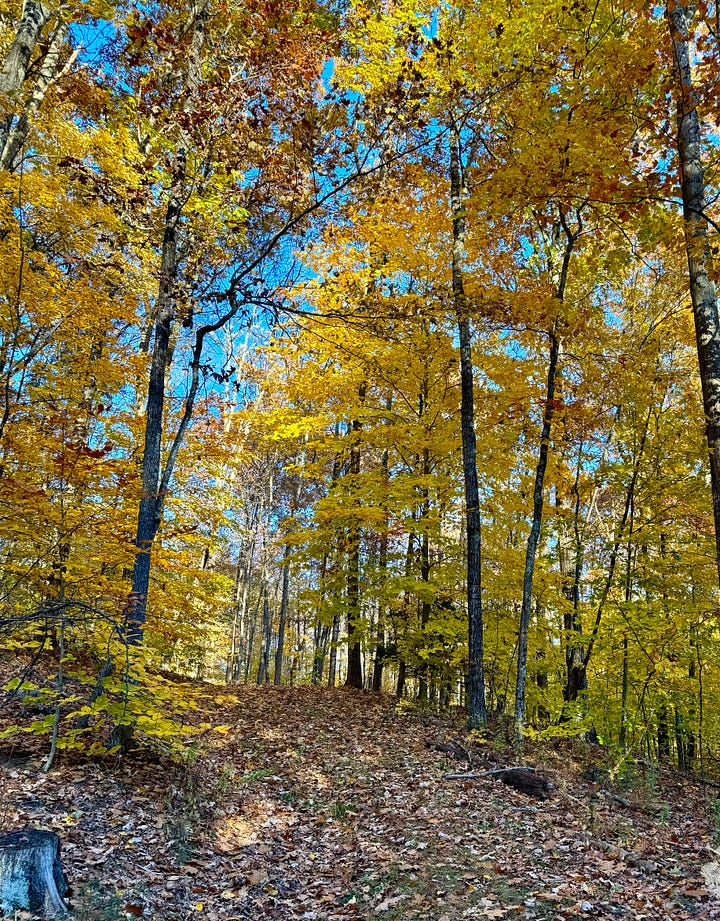
Until next time! Let me know what you’re reading this fall! 💕




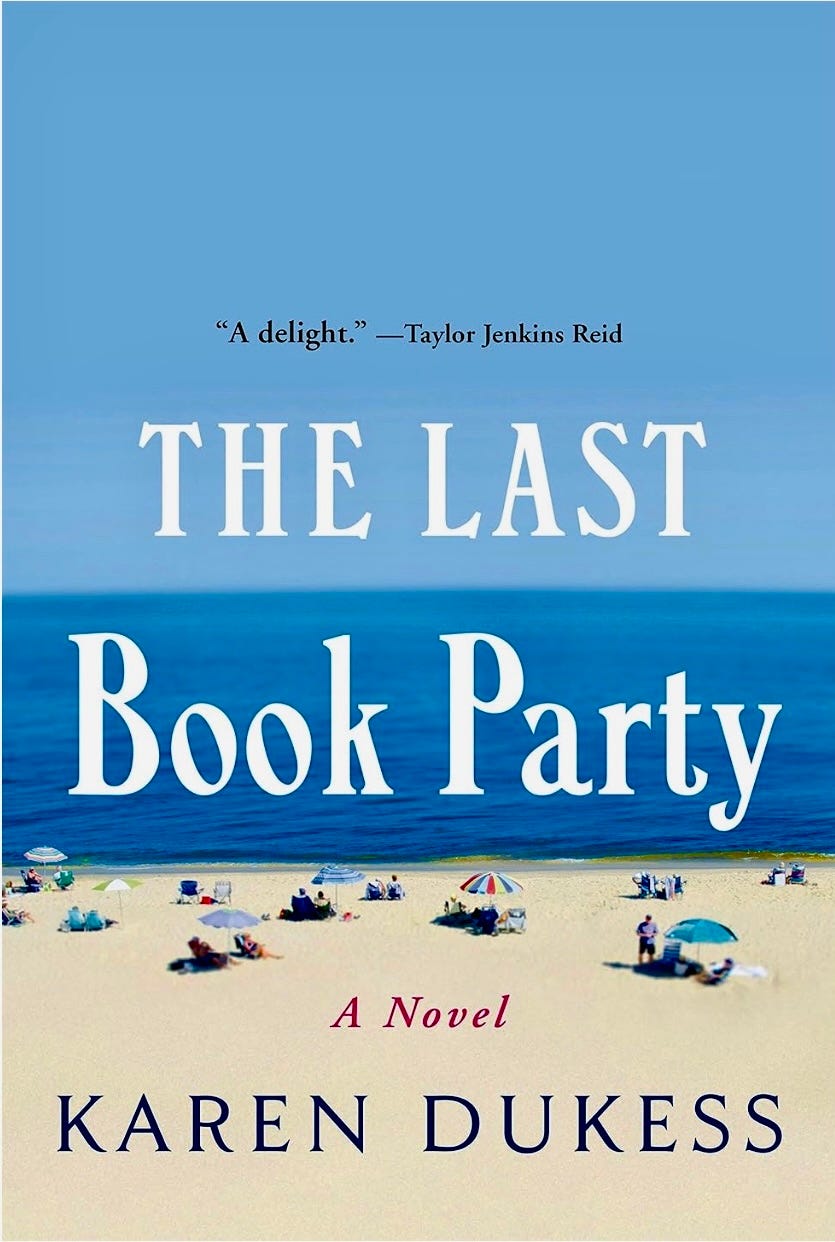

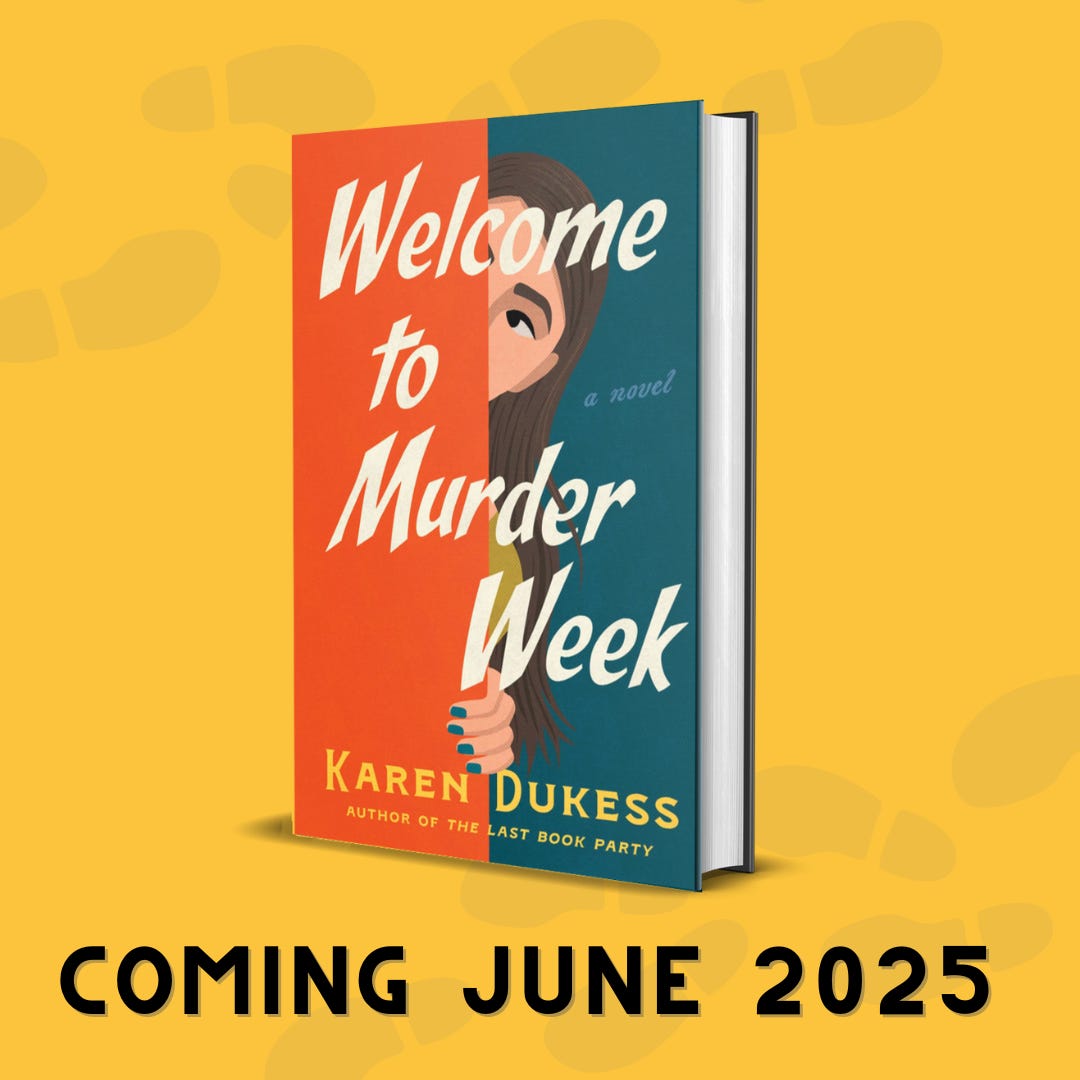


Karen is one of my favorite writers. I loved reading this
Oh my, more Otto pics please!